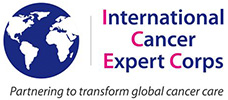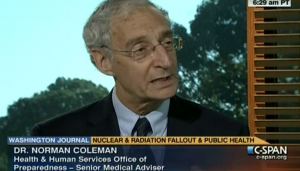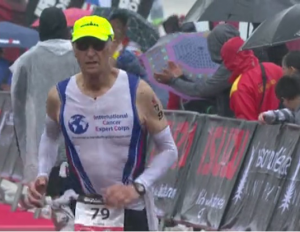C. Norman Coleman, MD, 1945-2024
Establishing a Legacy of Mentorship and Partnership
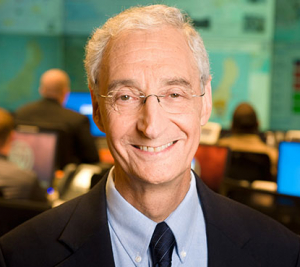
It is with great sadness that we inform the global community of the death of our dear colleague and friend, Dr. C. Norman “Norm” Coleman, who passed away on March 1, 2024. Norm was diagnosed in December 2023 with an aggressive sarcoma. Despite enrolling in an immunotherapy clinical trial at the National Cancer Institute (NCI), his cancer progressed relentlessly. During the subsequent weeks, Dr. Coleman remained engaged and continued to work full-time in his roles as Associate Director of the Radiation Research Program (RRP), as Senior Investigator in the Radiation Oncology Branch (ROB) in the Center for Cancer Research and as leader of his own research laboratory at NIH. Norm continued his work with the International Cancer Expert Corps, an official NIH outside activity for Norm, until mid-February.
Dr. C. Norman Coleman, or “Norm” to family, friends, and colleagues was a leader in cancer treatment and research globally. Dr. Coleman had served as Associate Director for the Radiation Research Program and Senior Investigator in the Radiation Oncology Branch in the Center for Cancer Research for the National Cancer Institute since 1999. Previously, he had served on the faculty of Stanford Medical School and as Chair of the Joint Center for Radiation Therapy at Harvard Medical School. He is a co-founder of and Senior Scientific Advisor to the International Cancer Expert Corps (ICEC) which was an official outside activity at NIH.
For Dr. Coleman, patients were always at the center of his attention, whether it was those he treated, cancer survivors and their families or those for whom better treatments and research were needed. From his days in medical school and throughout his career, he was dedicated to addressing inequities in health care. His passion for improving cancer treatment for those most in need ultimately led in 2013 to his founding the Washington DC-based nonprofit organization, the International Cancer Expert Corps.
He often credits his good fortune to having wonderful mentors and colleagues that made his achievements possible. Thus, training and mentoring the next generation of physicians and physician-scientists became not only a priority but a truly satisfying obligation for him. There are scores of beneficiaries of his efforts in our country and across the globe. This interest in mentoring became a primary focus for the creation of ICEC. His contributions to the improvement of cancer care globally have empowered not just his colleagues but the broader cancer community to push for large-scale solutions to the disparities in access to treatment of cancer, especially in Low-and Middle-Income Countries.
Dr. Coleman grew up in Brooklyn, New York, and later moved to Teaneck, New Jersey where he finished high school. A graduate of the University of Vermont as a mathematics major, he went on to receive his MD from the Yale School of Medicine. He completed his internship and residency in internal medicine at the University of California, San Francisco after which he did a fellowship in medical oncology at the National Cancer Institute. In 1975, Norm headed to Stanford University for his residency in radiation oncology under the mentorship of Dr. Henry Kaplan, known for co-developing the first medical linear accelerator in the Western Hemisphere and for treating the first patient with linear accelerator-based radiation therapy in the United States. Dr. Coleman is triple board-certified in internal medicine, medical oncology, and radiation oncology.
In 1985, Coleman, at 39 years old, joined Harvard Medical School as the Fuller-American Cancer Society Professor and Chairman of the Joint Center for Radiation Therapy. He remained at Harvard for 14 years specializing in sensitizer work and stress biology, before moving to work at NCI. At the time of his death he worked at NCI as the Associate Director for the Radiation Research Program (RRP) and Senior Investigator in the Radiation Oncology Branch (ROB) in the Center for Cancer Research. Dr. Coleman’s research at the National Cancer Institute focused on developing molecular targeted radiation therapy based on an interest in tumor- and radiation- induced stress responses in patients. His other interests included radiation biomarkers and multi-modality therapy in cancer care.
Dr. Coleman’s national and global impact throughout his career is immense and tangible. His impact became especially visible to the public when the September 11th terrorist attacks led to increased concerns about the potential of improvised nuclear devices. Amidst public paranoia and concern, he assembled a group of radiation, biology, and oncology experts to identify gaps in knowledge, which led to the establishment of the US Department of Health and Human Services, Radiological and Nuclear countermeasure programs at both NIH and ASPR. Additionally, Dr. Coleman developed the blueprint for responding to radiological and nuclear incidents that is used to inform planning activities today.
Dr. Coleman was a key advisor to the Office of the Assistant Secretary for Preparedness and Response (ASPR) in the US. Department of Health and Human Services. His work included responding to events such as the Fukushima nuclear accident in 2011. Immediately after the Tohoku Earthquake and Tsunami event, Coleman spent time in Japan working with his Japanese counterparts analyzing radiation data and potential solutions to counteract radioiodine contamination, assisted in issuing travel warnings, and held informational televised town hall meetings to embassy staff and to Japanese and Americans in-country nationwide. As is characteristic of his modest approach to public service, Coleman said of his time there, “I was in Japan for three weeks working with people from other agencies and experts from around the world to help them get through it. All the preparation we did was very timely.” In recognition for his efforts, that same year, Coleman was awarded the Samuel J. Heyman Service to America medal for Homeland Security, an awards program commonly heralded as the ‘Oscars’ of public service.
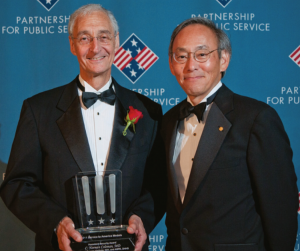
C. Norman Coleman, MD, with Steven Chu, PhD, former Secretary of Energy with the 2011 Samuel J. Heyman Service to America medal
Dr. Coleman received many awards and honors throughout his career including the 2005 ASTRO Gold Medal, the Radiation Research Society’s 2016 Failla Award, the National Coalition for Cancer Survivorship’s 2018 Ellen Lewis Stovall Patient Centered Cancer Care Award, the National Council of Radiation Protection and Measurement’s 2019 Warren Sinclair Medal and the Administration for Strategic Preparedness and Response’s (ASPR) 2023 D.A. Henderson Lifetime Achievement Award. In 2015, Dr. Coleman’s alma mater, the University of Vermont, awarded him a Doctor of Science (honoris causa) for his contributions to public service and society.
Dr. Coleman’s long history of efforts to improve cancer care in low-resourced regions of the world and for underserved communities in developed countries is evidenced in his personal and professional outreach. At Stanford, Dr. Coleman assisted in developing a community radiation oncology satellite program. While at Harvard, he created an innovative academic-community outreach model for underserved communities in the greater Boston region. At the National Cancer Institute, his conceptual design of the Cancer Disparities Research Partnership program was successfully implemented and serves as a template for the future of mentorship and partnership programs in underserved regions across the U.S. This mentorship model also represents the core mission of ICEC in its efforts to improve access to and the quality of cancer care in low-and middle-income regions.
Dr. Coleman has been active in developing working relationships with international groups for decades. Two examples are the All-Ireland Cancer Consortium in 1999 and the Singapore Cancer Syndicate in 2002. One of his most rewarding relationships was participating in the development of the King Hussein Cancer Center (KHCC) in Amman, Jordan that is recognized as one of the most prestigious cancer centers in the Middle East. Formerly the Al-Amal Center, KHCC was described as having been “transformed” through its achieving Joint Commission International Accreditation, in part because of its level of professional training and collaborative leadership structure involving regional experts. As Dr. Coleman once noted, “Cancer is a good common enemy. People don’t want to be told what to do, but there’s so much we can learn from one another. They can teach us how to solve problems with limited resources, and we can help them figure out how to develop their own programs.”
In 2023, the Paul Kaplan estate made a generous donation to establish the C. Norman Coleman/ Paul Kaplan Endowment Fund for Mentorship. Paul, the son of Dr Henry Kaplan, Norm’s mentor, was a lifelong friend since Norm’s days at Stanford. The Fund in its first year funded five small research projects in Nigeria and Tanzania where the researchers are dedicating their efforts to improve the level of access to and the quality of treatment of cancer in their countries.
In addition to his academic prowess and leadership abilities, Dr. Coleman’s colleagues, family, and friends often attest to his optimism and wit, as well as his uncanny ability to provide a large-scale, broader perspective to issues, especially in his field of work. Dr. Eric Bernhard, Dr. Coleman’s colleague at NIH, expressed admiration for his expertise and perspective during the Fukushima nuclear incident. “Norm has thought about these horrific situations from every angle, all the way from the ethical dilemmas that may arise to what’s going on with a victim at the cellular level,” he noted, adding that his experience brought a ‘a rational, scientific-based approach to deal with exactly the type of situation in Japan.’
Dr. Coleman’s longtime friend and ICEC colleague, David Pistenmaa, who was on the faculty when Norm started his radiation oncology residency at Stanford in 1975 commented: “I probably learned as much about chemotherapy from Norm as he did about radiation therapy from me. He treated all members of the Department staff as well as his patients with equal respect. I have had great respect for his academic accomplishments over the years and for his physical stamina, participating in full-IRONMAN® races initially and even half-IRONMAN races in his 70’s. Unfortunately, Norm could not outrun his rare aggressive cancer, but his competitive and compassionate spirit will carry on.”

